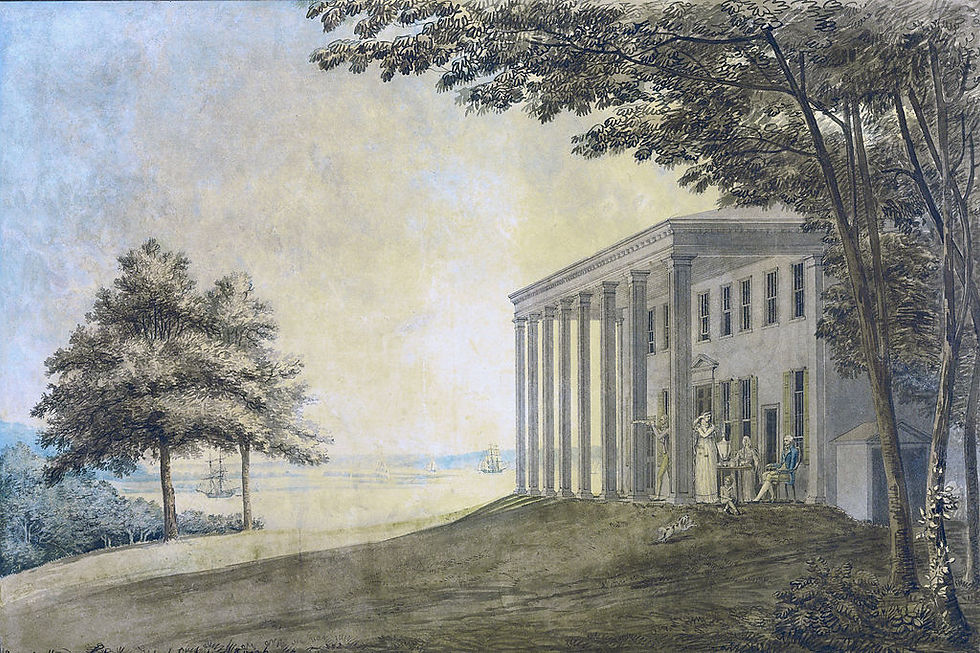This Day in History: The origins of the Constitutional Convention
- tara
- May 14, 2023
- 3 min read
Updated: Jul 9, 2024
On this day in 1787, the Constitutional Convention is scheduled to begin—but nothing happened! The Convention couldn’t get started, because only a handful of delegates had arrived in Philadelphia. A quorum of seven states was not present until May 25.
Did you ever wonder who had the idea to hold a convention in the first place?

It all started with the Potomac River. At the time, some thought that the river would be one of the main navigable routes toward the interior of the country. Indeed, in 1785, Maryland and Virginia were embroiled in a dispute regarding navigation on the River. A conference was held at George Washington’s Mt. Vernon to reach a settlement, but that meeting proved to be so much more. It provided the impetus for a new convention. Navigation of the Potomac was important, but it wasn’t the only issue facing the country. Americans were generally facing difficulties stemming from an inability to work together. Something had to be done.
Thus, a second convention, the Annapolis Convention, was born!
That Convention was supposed to begin on the first Monday in September 1786, but delegates were late to this convention, too. Travel was tough in those days. Only 5 states were represented when the convention finally began on September 11. But the delegates decided that more states needed to be represented and some of the states’ delegations needed broader authority to act if they were to accomplish anything.
The Annapolis Convention thus issued a recommendation for a new meeting “at Philadelphia on the second Monday in May next, to take into consideration the situation of the United States, [and] to devise such further provisions as shall appear to them necessary to render the constitution of the Federal Government adequate to the exigencies of the Union . . . .”
Importantly, the Annapolis Convention also asked that delegates to this new convention be given more authority. They wanted the states to “extend[ ] the powers of their Deputies, to other objects, than those of Commerce . . . [T]he power of regulating trade is of such comprehensive extent, and will enter so far into the general System of the federal government, that to give it efficacy, and to obviate questions and doubts concerning its precise nature and limits, may require a correspondent adjustment of other parts of the Federal System.”
The request for more authority is important. The Annapolis Convention adjourned in part because it did not have enough latitude to act. When the new Constitutional Convention convened in May 1787, those delegates had been entrusted with more authority by their states. (True, the Continental Congress tried to limit the Convention, but the delegates would have looked to their states’ instructions, not the congressional ones.)
In short, the Constitutional Convention was not a “runaway convention,” as is commonly believed.
Every state except Rhode Island appointed delegates to attend this new Convention in May 1787. Unfortunately, on May 14, only two states were represented: Virginia and Pennsylvania. By May 20, George Washington was complaining that delegates were coming into town too slowly: He wrote that the “delays greatly impede public measures, and serve to sour the temper of the punctual members who do not like to idle away their time.”
Others worried, too. James Monroe wrote to James Madison, then in Philadelphia: “We all look with great anxiety to the result of the Convention at Phila. Indeed it seems to be the sole point on which all future movments will turn. If it succeeds wisely & of course happily, the wishes of all good men will be gratified.”
Naturally, the story about our Constitutional Convention is a story for another day.
Primary Sources:
George Washington, Diary entry (May 14, 1787)
John P. Kaminski, The Great Virginia Triumvirate: George Washington, Thomas Jefferson, and James Madison in the Eyes of Their Contemporaries (2010)
John R. Vile, The Constitutional Convention of 1787: A Comprehensive Encyclopedia of America's Founding (2005) (Vol. I)
Letter from George Washington to Arthur Lee (May 20, 1787)
Letter to James Madison from James Monroe (May 23, 1787)
Proceedings of Commissioners to Remedy Defects of the Federal Government : 1786 (Annapolis; Sept. 11, 1786)
Robert K. Wright, Jr. & Morris J. MacGregor, Jr., Soldier-Statesmen of the Constitution (Center of Military History; U.S. Army; 1987) (Appendix A)
Virginia General Assembly Commission for Delegates to Annapolis Convention State (Colonial) Legislatures (Jan. 21, 1786)



Comments